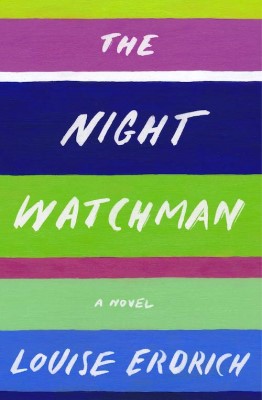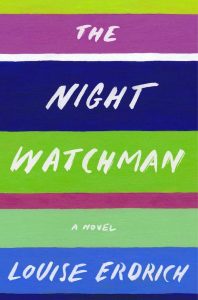
The Indigenous Literature Reading Group met on 29th January 2021 to discuss Louise Erdrich’s latest novel, The Night Watchman (HarperCollins, 2020). Here, Dr Danne Jobin offers a review of the book and a summary of the discussion.

Louise Erdrich’s latest novel, The Night Watchman (2020), was inspired by the life of her grandfather Patrick Gourneau who was a tribal chairman during the Termination era of the 1950s. While protagonist Thomas Wazhashk gathers support from the Turtle Mountain Chippewa community to oppose the U.S. Congress, other narrative threads deftly follow characters through boxing matches, urban missions, bear hunts, and tangled love stories. In contrast with Shadow Tag (2010) and even the Justice trilogy (2008-2016), The Night Watchman widens the narratological scope to embrace multiple characters from the Turtle Mountain community and present different models of kinship than the nuclear families that had become more present in Erdrich’s recent publications. It is also explicitly political as the novel explores the era immediately preceding relocation in the 1950s. If Erdrich was accused of not being political enough in the early days, it would be impossible to leverage the same argument now. Like the Justice trilogy, The Night Watchman actively identifies the settler-colonial threats that attempt to undermine tribal sovereignty.
The novel deals with difficult topics very sensitively. Paranteau’s alcoholism represents a problem that was rife in the 50s but does not dominate the narrative. Other threads touch upon the issue of missing and murdered Indigenous women. One such subplot follows Vera, who has fallen into the hands of sex traffickers, without being gratuitous, suggesting more than it shows to avoid sensationalism. Patrice’s experience of the city also tests the dynamic between exploitation and agency with a lot of care. The nuanced portrait of her exploiters and the economics of the bar where she briefly works as a performing “waterjack” are also well handled, showing a lot of nuance.
The Night Watchman investigates the politics of positionality and representation through several characters. Millie, the young Native scholar who lives in Minneapolis, occupies an insider/outsider position in relation to Turtle Mountain, being there as both a relation and a researcher. In contrast, the white teacher Barnes is more firmly perceived as an outsider despite being treated with respect and understanding. Going to the cities also repositions Patrice: she develops an understanding of the harshness and attractiveness of urban modernity even as she receives training in traditional lifeways from her mother Zhanaat on the reservation. Millie’s plan to come back and learn from Zhanaat as part of an anthropological project asks questions about the field’s tradition of objectification and how to design research that supports the community. These aspects of the narrative also play with the reversal of the colonial gaze, especially when Thomas Wazhashk uses his boarding school training to read the Book of Mormon and turn this knowledge against governor Watkins.
As is typical of Erdrich’s writing, the novel blends realism with magic, weaving the spiritual into material realities. The Night Watchman animates industrialised environments as well as natural spaces, representing the mechanics of the factory with vivacity and making the city itself vibrant. The novel’s treatment of industry and the possibilities it offers in conjunction with tribal sovereignty outlines another avenue for self-determination alongside traditional lifeways, farming and research.
The Night Watchman is one of Erdrich’s most accomplished novels to date. A long time in the making, it is representative of the change in wider political discourse regarding Indigenous concerns. Thanks to a more educated readership – due in part to Erdrich’s own work and a widening readership for Native American and First Nations writing, the ripples of political movements such as Idle No More and #NoDAPL and increasing educational inclusion of Indigenous histories, there is space for a novel that unapologetically tackles the colonial regulations that threatened tribal communities’ existence in the 20th century. The Night Watchman is ambitious in format and demonstrates the skills and confidence the author has acquired. Like the grandfather who became Thomas Wazhashk in the narrative, Erdrich draws on her sense of responsibility for the community and bears witness to its nuanced and complex interwoven stories.
Dr Danne Jobin holds a PhD from the University of Kent. They are working on a monograph based on their thesis, “Mapping out Native American space in Contemporary Anishinaabe Fiction,” which looks at the expansion of Indigenous space beyond reservation boundaries towards urban, transnational, and futuristic spaces. Danne is also co-editing a special issue of Transmotion on Transgender, Two-Spirit and Nonbinary Indigenous Literature and developing new research in trans* Indigenous poetics. Their poetry has been published in Datableed, harana poetry and Tenebrae. They are also on Twitter at: @DrDanne.